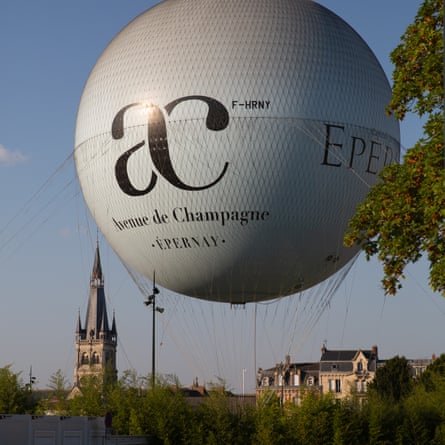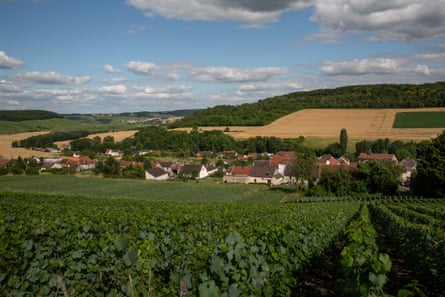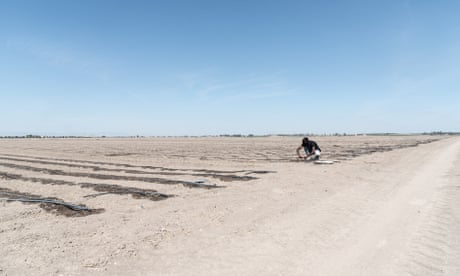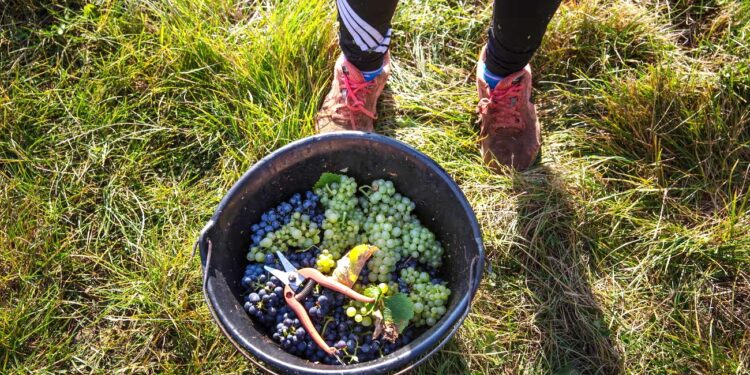A Guardian investigation has found workers in France’s champagne industry are being underpaid and forced to sleep on the streets and steal food to stave off hunger.
Workers from West Africa and Eastern Europe in the town of Épernay, home to the headquarters of some of the world’s most expensive champagne brands, including Moët & Chandon and Mercier, claim that they are either not being paid for their work or illegally underpaid by vineyards near the town.
The Guardian found workers in the town sleeping on the streets or in tents as the vineyards did not provide accommodation. Other workers staying in a nearby village said they had been forced to steal food from local people as they did not have anywhere to buy provisions.
Last year, 300m bottles of champagne from the vineyards of northern France were shipped around the world, generating €6bn in revenues.
Yet the champagne industry has been hit by a string of controversies related to its treatment of grape-pickers, with four workers dying from suspected sunstroke during last year’s harvest. In a case scheduled to go to court early next year, four people, including a vineyard owner, have been charged with human trafficking.

In Épernay, the grand offices of the world’s most luxurious champagne brands sit side by side on the town’s Champagne Avenue, where tens of millions of bottles of champagne reported to be stored underground have led the avenue to be named the “richest street in the world”.
Just a few minutes walk away, dozens of workers responsible for harvesting the champagne grapes are getting ready to sleep in the doorway of the cinema opposite the town’s main train station.
Another group of people from French-speaking Africa are collecting belongings hidden in bushes after returning from a day’s grape-picking. One of them, Youniss, says he’s been working on vineyards for three days but remains vague about where he will be sleeping tonight, saying “outside”.

Youniss, like other workers, had been drawn to the region by the promise of a well-paid job picking some of the most expensive grapes in the world during August and September. Even the cheapest bottle of champagne is rarely sold for less than £20.
Another worker, Nora*, says she was left to sleep on a soaking mattresses in a tent after heavy rainfall during this year’s harvest. She says they were put under pressure to work faster. “Every night, we wondered whether we were going to be fired the next morning or not.” Her payslip showed she was paid less than the French minimum hourly wage, and no overtime.
Unions blame vineyards for continuing to blindly accept cheap labour and the sector as a whole for failing to ban exploitative labour providers. They say some vineyard owners try to justify themselves by arguing that they are “helping African migrants” by giving them employment, even if it is underpaid.
“It’s greed. The grapes are selling for €10 to €12 a kilo (£8-£10), so it’s shocking to treat people this bad,” says José Blanco, secretary general of the General Confederation of Labour (CGT) trade union in the Champagne region. “They look at them as machines and not humans.”
Kanouté was living in Paris when he heard about “a job in the countryside” promising €80 a day. Originally a migrant from Mali, he had been surviving for a decade on a series of low-paid cleaning and dishwashing jobs, so jumped at the opportunity.
A few days after starting work in September 2023, Kanouté, 30, says he and more than 50 other workers – most of whom were undocumented migrants from west Africa – found themselves hungry and living in a dilapidated house in the village of Nesle-le-Repons, on the Champagne tourist route in north-east France.

They had been left to survive on one sandwich a day given to them at lunchtime as they were transported between vineyards in the area, says Kanouté, and became so desperate that they started to steal food from neighbouring fields in the village.
When we denounce what’s happening in Champagne, it’s omertà. Everyone keeps quiet
José Blanco, CGT union
“We worked hard and were promised a salary and bonuses, but we didn’t get anything,” he says. “We’d go round ringing people’s doorbells looking for cigarettes. Sometimes, people would see us coming and close the doors. It was hard on our dignity.”
The legal minimum wage is €9.23 an hour after deductions meaning the workers should have been paid between €100 and €110 each day – much more than the €80 promised by the recruiters. Kanouté says he ended up being paid €200 by the providers for one week of work. Most of the other workers allegedly returned to Paris without any payment for their labour.
“They were treated like dogs,” a retired winegrower living opposite the workers’ house in the village says. “The people who do that aren’t winegrowers: they’re exploiters. It’s a shame, it doesn’t give a good image of Champagne.”

Unions said conditions were going backwards in the champagne sector and that labour providers offered poor conditions and low pay because of winegrowers’ insistence on cheap labour. But it is hard to hold specific champagne houses responsible for the exploitation of workers, says Blanco, because of a system of “Russian dolls” where you have “one company delegating to another and so on”.
In Kanouté’s case, neighbours notified the police. The boss of a labour provider, two of her agents and one of the winegrowers who used the provider have now been charged with human trafficking, providing unfit accommodation and nonexistent or inadequate pay. They are due to appear in court in March.
In Épernay, staff at the Palace cinema next to the train station say rough-sleeping workers during the harvest period was a recurring problem and that the dozen or more they found this year had just been looking for somewhere out of the rain.
“It has been so cold this year that we went home wondering if they’d still be alive in the morning,” says Elise, who has worked at the cinema for the past two years and says she saw minibuses dropping the workers off every evening.
“They [the city] just want to move the workers on because we get a lot of tourists now, but they should find a house for them. It is horrible. We asked our manager and gave them popcorn, cola and M&Ms, but we knew it wasn’t real food.”

A few kilometres outside Épernay, the Guardian met a group of Polish workers. They say they were working 10 hours a day and show employment contracts saying they are paid €11.40 an hour. That is below the legal minimum of €11.65 an hour before deductions. According to French law, workers should receive 25% more each hour in overtime if they work more than 35 hours in a week – and this rises to 50% if more than 43 hours a week are being worked.
The unions have called on the industry to start adding treatment of labour to its stipulations of what can be verified as champagne.

“When we denounce what’s happening in Champagne, it’s omertà. Everyone keeps quiet. The image of champagne is that of a party wine and luxury. People don’t want to think about allegations of human trafficking,” says Blanco.

In a statement to the Guardian, the industry body, Comité Champagne, says it has asked public authorities to step up controls and severely punish any abuses.
“When we hear these terms [human trafficking] associated with our region, we can only be shocked. These shameful practices do not reflect the commitment of a passionate profession and zero tolerance must be applied,” it says.
It has reminded winegrowers that “using a service provider cannot cost less than direct employment. Low prices may be an indication of dubious practices and should draw your attention.”
*Name has been changed
Source: The Guardian



Recent Comments